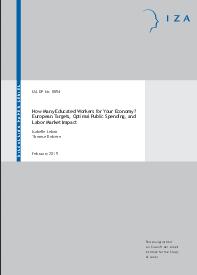Basse, T. (2015) “Searching for the EMU core member countries“, European Journal of Political Economy, Vol. 34, Supplement, Ιούνιος 2014, pp. S32–S39. This study uses techniques of cointegration analysis and tests for structural change to search for changes to sovereign credit risk in some relevant member states of the European Monetary Union (EMU) trying to identify core countries. While there are a number of core countries the empirical findings …Read More
Macroprudential spillovers: The role of organisational structure
Danisewicz, Ρ., Reinhardt, D. & Sowerbutts, R. (2015) “Macroprudential spillovers: The role of organisational structure“, VoxEU Organisation, 05 Μαρτίου. In a global financial system, macroprudential policies may create international spillovers. This column presents new evidence on how the organisational structure of a bank affects the magnitude of these spillovers. An increase in capital requirements at home causes foreign branches to reduce their lending growth to other banks operating in …Read More
How Many Educated Workers for Your Economy? European Targets, Optimal Public Spending, and Labor Market Impact
Lebon, Ι. & Rebière, Τ. (2015) “How Many Educated Workers for Your Economy? European Targets, Optimal Public Spending, and Labor Market Impact“, IZA DP No. 8854, Φεβρουάριος. This paper studies optimal taxation schemes for education in a search-matching model where the labor market is divided between a high-skill and a low-skill sector. Two public policy targets –maximizing the global employment level and optimizing the social surplus– are studied according …Read More
Corporate Taxation in Europe: Let’s get it together!
De Groen, P. W. (2015) “Corporate Taxation in Europe: Let’s get it together!“, Financial Markets, CEPS Commentaries, 16 Φεβρουαρίου More comprehensive cooperation in corporate taxation at European level could significantly advance the region’s socio-economic prosperity, but its potential contribution is unfortunately overlooked in the current search for growth and job creation. Lucrative tax niches established in some member states and the fear of losing fiscal autonomy prevent several countries from …Read More
Capital taxation in the 21st century
Auerbach, J. A. & Hassett, K. (2015) “Capital taxation in the 21st century“, VoxEU Organisation, 03 Μαρτίου. Piketty’s justification for his proposed wealth tax relies on the notion that the rate of return on capital exceeds economic growth. This column challenges this basis, arguing that it fails to account for risk. The authors also examine the relative merits of a consumption tax, which may be more valid. In Capital …Read More
Politics and investment: Examining the territorial allocation of public investment in Greece
Rodríguez-Pose, Α., Psycharis, Υ. & Tselios, V. (2015) “Politics and investment: Examining the territorial allocation of public investment in Greece“, VoxEU Organisation, 03 Μαρτίου. Electoral results and the geographical allocation of public investment in Greece have been intimately related. This column describes how incumbent Greek governments between 1975 and 2009 tended to reward those constituencies returning them to office. Increases in both the absolute and relative electoral returns for …Read More
ECB minutes: What they really tell us”
Wyplosz, C. (2015) “ECB minutes: What they really tell us”, VoxEU Organisation, 02 Μαρτίου. The ECB has finally begun releasing the minutes of its policymaking meetings, something the world’s major central banks have been doing since the 1990s. This column asks whether the publication of these minutes increases ECB transparency. While providing useful information on analysis at the ECB, the minutes lack the details on the actual discussions and …Read More
Potential growth rates and the working of SGP fiscal rules
Cottarelli, C. (2015) “Potential growth rates and the working of SGP fiscal rules“, VoxEU Organisation, 02 Μαρτίου. The European Commission has clarified the flexibility in existing Eurozone fiscal rules. This column argues that the emphasis on structural rather than headline deficits is desirable but requires identification of potential growth rates. The way the Commission currently estimates potential output yields potential growth estimates that are very low. Thus, a year …Read More
What is a ‘responsible’ fiscal policy today for Europe?
Buti, Μ. & Carnot, Ν. (2015) “What is a ‘responsible’ fiscal policy today for Europe?“, VoxEU Organisation, 24 Φεβρουαρίου. In an uncertain world, fiscal policy must be robust to a range of models. This column introduces a rule of thumb governing fiscal expansion that is consistent for a group of countries, and for each country individually. Applying this rule to the Eurozone recommends overall fiscal neutrality, with moderate consolidation …Read More
Why did Britain join the EU? A new insight from economic history
Campos, F. N. & Coricelli, F. (2015) “Why did Britain join the EU? A new insight from economic history“, VoxEU Organisation, 03 Φεβρουαρίου. Britain eschewed EU membership in the late 1950s but changed its mind in the early 1960s, only to be rebuffed by Charles de Gaulle. Membership came only in the early 1970s. This column argues that, among others, Britain joined the EU as a way to avoid …Read More






